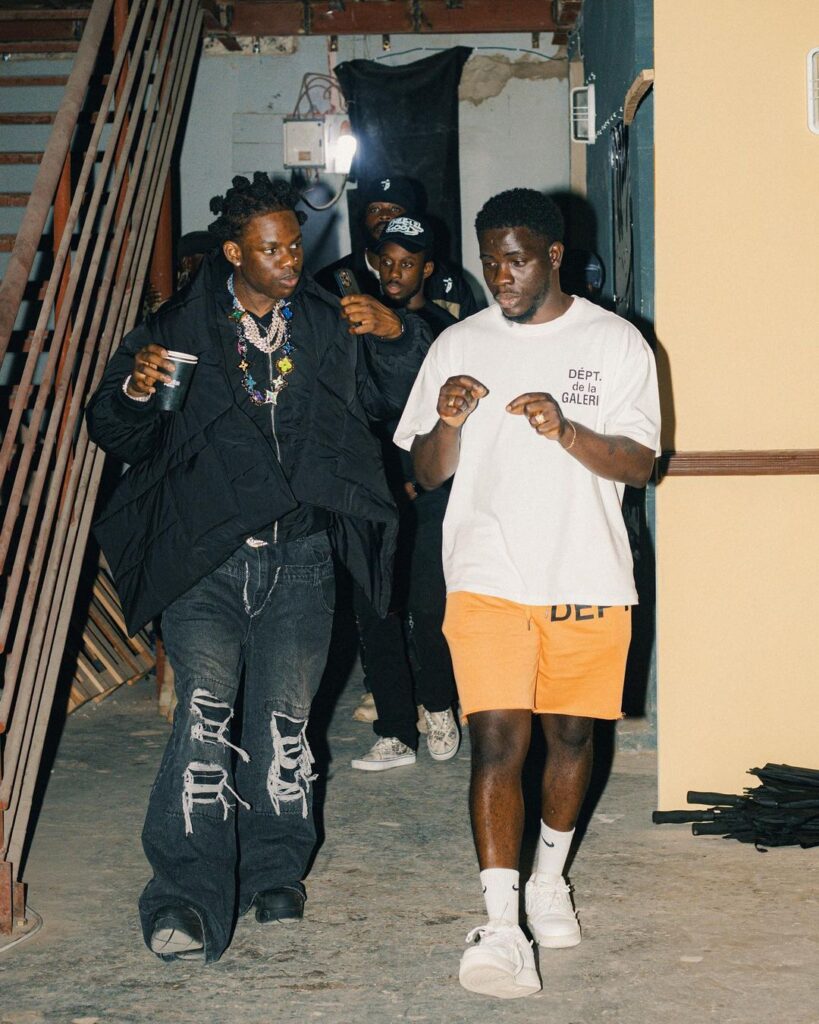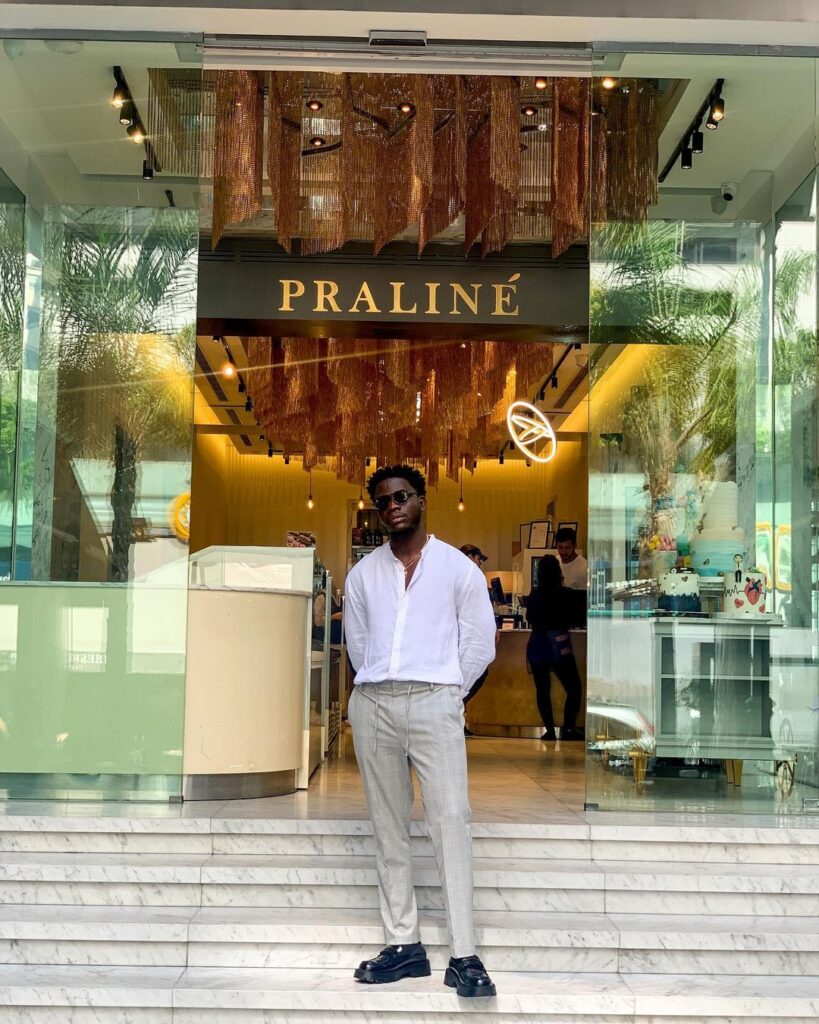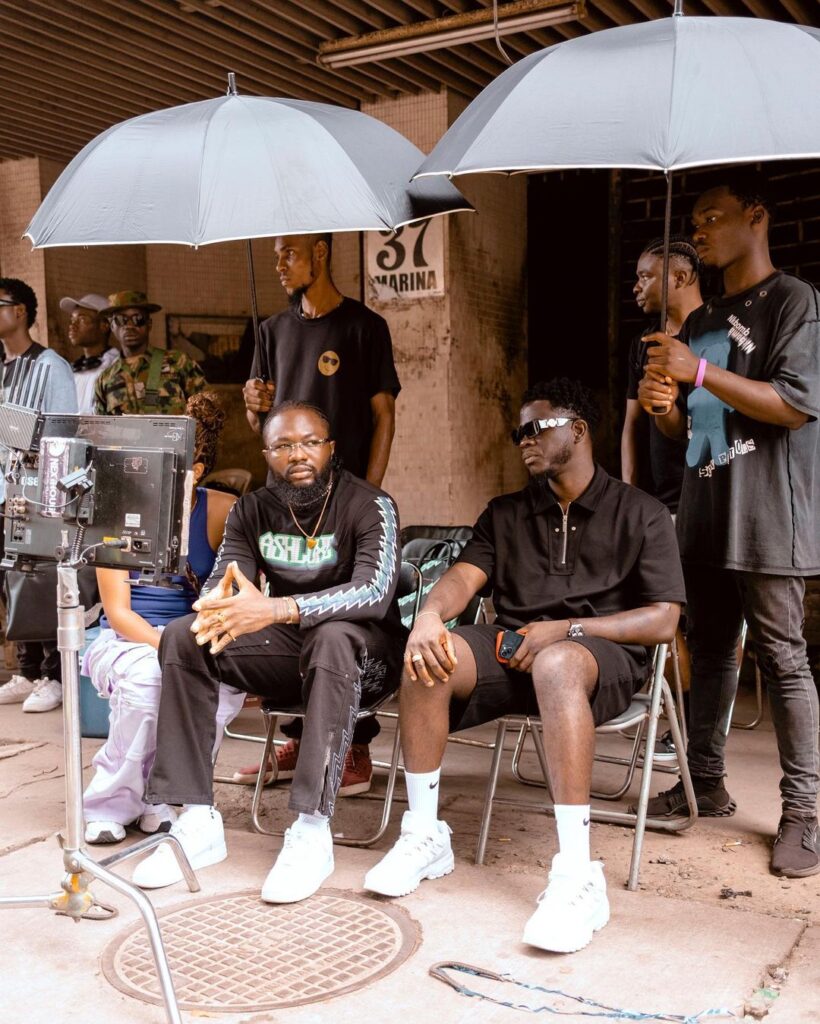“For me, life isn’t an elevator, but a staircase, and the small step you take in the right direction might turn out to be the most significant step of your entire life.”
By Emmanuel Okoro
Creatives are perpetually on the move. For every success, every accolade, and every standing ovation, there is always an inner drive that propels them forward. The thrill of pushing their set boundaries becomes an unending pursuit. Femi Dapson, one of Nigeria’s award-winning music video producers, embodies this tenacity in his work. His creative process is what brings an artiste’s vision to life, and by assisting the music video director, those colourful visuals are animated. But just as quickly as an imagined vision is made reality, he moves on to the next challenge to explore new creative horizons.
In a virtual interview with Afrocritik, Dapson discusses various aspects of his life, including challenging projects, work-life balance, and his life philosophy. When he hops on the call, he enthusiastically greets me with, “How far nau?” After we exchange pleasantries, he mentions that he is about to jump on a ride en route to a work-related event, and we will be discussing while he’s on the move.
Dapson appears relaxed about the situation while I can’t help but be concerned about potential network connectivity issues. After all, this is Nigeria, where internet connection can inexplicably disappear at any moment. Mid-conversation, he momentarily excuses himself from the call to exchange affectionate words with his girlfriend, with audible sounds of hugging filling the background, leaving me green in subtle envy. After what feels like an eternity, he returns to the call. Of course, I do not let it slide. I tell him, “So, you’re not giving single people a chance to breathe?” to which he responds with a laugh, “It’s not like that”.
The Music Video Producer Who Has Earned the Bragging Rights
Dapson is the founder and executive producer at Nouvelle Films, a visual production, motion graphics, and distribution company. He is the brainchild behind the production of a long list of music videos, including Bella Shmurda’s “Contraband”, ChopLife SoundSystem and Mr Eazi’s “Wena”, Joeboy’s “Body and Soul”, DJ Big N’s “How Many Times”, Rema’s “Charm”, Blaqbonez’s “Back in Uni” and “Like Ice Spice”, Johnny Drille’s “Believe Me”, Bnxn’s “Gwagwalada”, Zinoleesky’s “Personal”, and Zlatan’s “Astalavista”.
One might wonder, as I have in the past, what separates a music video producer from a video director. It is also particularly natural for people to confuse both roles. While a director primarily deals with the creative and artistic vision of the music video, the producer is tasked with planning, organising, and overseeing the entire project. Dapson, through Nouvelle Films, focuses on scriptwriting, storyboarding, location casting, editing, cinematography, and all other necessary logistics for a seamless production process.
Beyond his extensive portfolio of music videos, Dapson has also experienced remarkable moments that caused a buzz on the Internet, particularly on X (formerly known as Twitter). The first instance was in response to a Flutterwave tweet that encouraged people to “brag about yourself”. Femi seized the opportunity to showcase his impressive line-up of high-profile music videos that he had produced. This line-up includes the visuals for Rema’s “Calm Down” – which won “Best Music Video” at the Headies Awards this year. The tweet has since generated over 3.5 million impressions.

The second time Dapson went viral was when he shared an infamous video from his past. It is a video from 2017, where he appears almost unrecognisable, as he can be seen working as a cleaner. What was interesting about the video was the way he motivated himself while he was diligently carrying out his duties, an attitude I think has followed him to his present position as one of the most sought-after creatives for music video productions. “I saved that video to my Google Drive,” Dapson confides in a sombre manner, “and had forgotten about it until I stumbled on it earlier this year and started screaming. I became everything I wanted to be.”
These two vital moments served as a catalyst for this interview, prompting the question: Who is Femi Dapson?
Putting in the Work
Born and bred in Lagos to parents of Oyo descent, Dapson was the third child of four siblings. He lived in Agege, a suburb mostly inhabited by low and middle-class households. Growing up in such an environment meant that he had to pick up odd jobs to make ends meet. Everything from house cleaning to painting, Dapson did them all. “But one thing that kept me moving was I knew that I wanted to make it in life, and this was what fuelled me into everything I did,” the creative opens up to me, “Trust me, I did everything legally possible to make it.”
Despite the challenges, Femi went on to pursue higher education, ultimately graduating with a degree in Business Administration from the prestigious University of Lagos (Unilag). However, schooling in Nigeria exhibits a particular uniqueness where individuals often study one thing and find themselves pursuing entirely different careers. Dapson’s educational background in particular illustrates this phenomenon. Upon finishing school, his primary objective was to secure a livelihood, and becoming a music video producer, at the time, was merely a means to an end.
His first foray into music video production began in 2020. As he reveals to me, these were the days of living and hustling with his friends in Egbeda, another Lagos suburb, amongst which were Perliks, a photographer with a keen eye for directing, and Macjreyz, an artiste under Mr Eazi’s talent incubation hub, emPawa Africa. Macjreyz had secured funding to shoot the visuals for his single, “Money Anthem”, and Perliks offered to direct the visuals. Dapson – who had little knowledge of production at the time – offered to manage the production.
The production expenses for the video totalled ₦800,000. Given that the typical budget for creating a basic music video hovers around ₦6 million, it was evident that they were operating at a financial loss for such a production. Nevertheless, that video, along with a few others he produced, served as a gateway to new opportunities. Industry experts who recognised his talent started entrusting him with projects. “And here I am,” Dapson says happily. “Years later, enjoying what I do.” When I ask him what makes him prolific and sets him apart from other producers in his field, he plays it off coolly, “I just focus on putting in the work, and that’s it.”
(Read also – Painting a New Way of Seeing Africa: In Conversation With the Filmmakers Who Took Mami Wata Global)
The Fun Projects Are the Most Challenging
Having taken an interest in Dapson’s works. I often ponder about which of his projects he considers his best. But the music video producer is usually unyielding in making a pick. In one interview with TVC in 2022, the question of his top five music videos was posed to him, to which he responded, “My latest works are my best works.” He gave the same response in another interview with TalkuTalku Magazine earlier this year. I do not bother pushing that question this time. Instead, I inquire about the most enjoyable projects he had worked on. He ponders on this for a while. “The most fun projects I work on often turn out to be the most challenging. But when you successfully pull it off, there’s a sense of satisfaction knowing you’ve created something extraordinary.”
The projects he considers fun to produce include Blaqbonez’s “Back in Uni”, Zinoleesky’s “Kilofeshe”, Rema’s “Calm Down”, Kizz Daniel’s “Cough (Odo)”, and L.A.X’s “Go Low”.
Among these, the Headies Awards-nominated “Back in Uni” for Blaqbonez held particular significance, encapsulating the major highlights of the Nigerian music industry in 2022. Dapson and his production team paid meticulous attention to detail, from Blaqbonez’s various hairstyles to the costumes, lighting, and set design, ensuring it all mirrored the original events.“For every time Blaqbonez appeared as someone else, we had to make sure he looked like that person correctly. The production demanded a significant amount of time and effort, and the result was astonishing. I was thrilled when it received a Headies nomination with “Calm Down”. But the Calm Down won, so it’s a win-win for me.”
There is a degree of meticulousness required in working on the visual concepts in video production, especially when working with different artistes, directors, casts, and crew, which can pose a significant challenge. Each artiste and director has a unique creative vision for a music video. Dapson’s delicate task involves balancing and aligning these visions with the overarching concept. This involves synergising with his team at Nouvelle Films to execute the task effectively.
Perhaps it is the African’s innate nature to be habitually late, or perhaps it is the artistes’ tight and demanding schedules, but one significant challenge Dapson faces is artistes arriving late to the set. To assuage this lateness, Dapson has developed a robust set of contingency plans for the best and worst-case scenarios, including the likelihood of artistes arriving late. For instance, if the artiste’s scheduled call time is 9 a.m., he coordinates the crew’s arrival for around 11 a.m. or noon. This strategic approach ensures that everything is set up and ready to launch when the artiste arrives, reducing the impact of potential delays.
In the event that an artiste does not show up at the scheduled time, Dapson’s role as a producer expands to include maintaining a positive and engaging atmosphere on set. This often involves keeping everyone entertained and in good spirits. This may include ordering food and drinks to energise the crew while awaiting the artiste’s arrival. Additionally, he ensures the artistes acknowledge their lateness and offer an apology to the crew, contributing to a vibrant and upbeat atmosphere during the shoot. Maintaining the crew’s morale is of utmost importance on set, as it helps de-escalate any potential conflicts between them and the artiste.

The subject of cultural representation and appropriation is also particularly vital when producing visuals for Nigerian and, by extension, African artistes. As global audiences become more acquainted with the rich sounds of Afrobeats, the question arises: how do directors and producers incorporate cultural elements?
Dapson finds this quite straightforward. Regardless of the location where the video is shot, his goal has always been to authentically represent the culture. He takes pleasure in contributing his ideas to the directors to ensure the most effective execution of cultural representation. “In some cases where shoots take place abroad, we might need to fly in some of these elements from Nigeria. Then again, Nigerians are everywhere, you know? So, we confer with them to ensure that the cultural aspects are accurately depicted both before and during the shoots.”
Navigating Fame, Social Media, and the Internet
Despite his fame, Dapson remains grounded, leading a humble and straightforward lifestyle. He has never allowed celebrity status to intrude upon the everyday activities and experiences he holds dear. Whenever he desires, he continues to spend time with his friends, indulge in street food from local vendors, and engage in the same ordinary pursuits that have been part of his life all along.
His approach to social media aligns with his overall demeanour and connection with people. He recognises the dynamic nature of social media as a platform for diverse emotions. While he acknowledges that people may sometimes express their criticisms and frustrations on his page, he generally chooses to overlook negative comments, understanding that such interactions can escalate if not properly handled.
Despite his reservations about the Internet, Dapson is unabashed in expressing his love for his girlfriend, Simi, who is an event host and fashion designer. Their social media handles on Instagram and X are regularly adorned with affectionate photos and videos capturing their shared adventures as they explore and unwind in captivating, far-flung destinations. Yet, the depth of their affection surpasses the confines of social media, as I personally witnessed their love in the fleeting moments before our interview commenced. When I delicately broach the topic of his girlfriend, he cheerfully replies, “I love her a lot, and I’m not afraid of showing her off.”
For a brief moment, I ponder how Dapson effectively manages the delicate balance between his professional commitments and his love life. However, he firmly believes that his girlfriend is an indispensable aspect of both his personal and professional life. Thanks to the convenience of internet-enabled devices, staying in touch has become effortless, enabling them to communicate whenever work keeps them occupied. With an air of importance, Dapson says, “I genuinely believe that someone can never be too busy for the ones they love.”

What Next for Dapson?
Dapson’s life philosophy revolves around the belief in destiny. He emphasises that everything is governed by destiny, from making the now-viral video in 2017 to the present where we have this conversation. He believes it was destiny that brought music video production into his life, and he embraced it. As he shares, “I believe that every intentional step I took was also a part of destiny.”
Beyond music video production, Dapson produces commercials and documentaries for brands and corporate organisations. The creative space is interwoven, and it is totally natural for music video producers to consider other ventures within the entertainment industry. When I ask him about his current and future plans, Dapson opens up about his interest in pivoting into film, perhaps even working on a feature film. But the time and space when this will happen, he cannot say, and again, he leaves it up to fate. “The idea is all up in my head, and when God says it’s time to do it, I’ll do it.”

Dapson has carved out an inspiring and exemplary path, and it is entirely natural for people to admire him and find motivation to chart their own course to success. To those who aspire to emulate his journey, he imparts the advice that the first crucial element is self-belief.
It is this unshakable self-confidence that drove him from producing an ₦800,000 music video to collaborating with some of the music industry’s leading figures. Emphatically, he says, “You need to believe that if FD (himself) can do it, you can, too. For me, life isn’t an elevator, but a staircase, and the small step you take in the right direction might turn out to be the most significant step of your entire life.”
Emmanuel ‘Waziri’ Okoro is a content writer and journo with an insatiable knack for music and pop culture. When he’s not writing, you will find him arguing why Arsenal FC is the best football club in the multiverse. Connect with him on Twitter, Instagram, and Threads: @BughiLorde





This is awesome. I love the write-up; it’s rare to see interviews depicted like this.